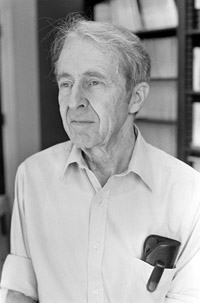Mathematician George Carrier dies at 83
George Francis Carrier, one of the world’s pre-eminent applied mathematicians and T. Jefferson Coolidge Professor of Applied Mathematics Emeritus, died of cancer in a Boston hospital on March 8. He was 83 and lived in Wayland.

Carrier had a special talent for describing complex physical systems mathematically. He would then deduce analytical solutions that predicted the systems’ behavior. He applied his talents in many fields, with an emphasis on fluid mechanics, combustion, and tsunamis (destructive ocean waves generated by earthquakes).
Carrier’s modeling and mathematical abilities were remarkable. The late Bernard Budiansky called him a magician. In his early years at Harvard, some graduate students were reluctant to ask him for mathematical help in fear that he would solve their problem at the blackboard in his office.
Carrier was born in 1918 in Millinocket, Maine. His father was superintendent of the Great Northern papermaking plant in Millinocket, and George often visited the mills with his father. These early contacts with physical problems of structures and fluid flow led him to attend the engineering school at Cornell University. He received a master’s in engineering degree in 1939 and a Ph.D. in 1944, both from Cornell University.
A two-year postdoctoral appointment at the Harvard Engineering School (now the Division of Applied Sciences and Engineering) was followed by his appointment as an assistant professor at Brown University in 1946. He became an associate professor in 1947 and professor in 1948. At Brown, Carrier participated in a program sponsored by the Air Force to review all current literature in the field of supersonic flow.
In 1952, Carrier was appointed Gordon McKay Professor of Mechanical Engineering at Harvard, where he remained throughout his career. In 1972, he was awarded the T. Jefferson Coolidge chair in Applied Mathematics.
Carrier is co-author of the mathematical texts “Functions of a Complex Variable, Theory and Technique,” “Ordinary Differential Equations,” and “Partial Differential Equations: Theory and Technique.” “Ordinary Differential Equations” was republished by the American Mathematical Society as part of its “Classics in Applied Mathematics.”
Carrier also authored or co-authored more than 100 technical papers published in various journals. He was an associate editor of the Journal of Fluid Mechanics, the Quarterly of Applied Mathematics, and the SIAM Journal of Applied Mathematics.
His scientific accomplishments were honored by election to the National Academy of Sciences, the National Academy of Engineering, the American Academy of Arts and Sciences, and the American Philosophical Society. He was an honorary fellow of the (British) Institute of Mathematics and Its Application. Carrier also served as a member of the boards of trustees of Rensselaer Polytechnic Institute, as a member of the U.S. National Committee of Theoretical and Applied Mechanics, and as a member of the Corporation of the Woods Hole Oceanographic Institution.
After his election to the National Academies in 1967, Carrier served on 27 committees or panels, chairing committees on The Policy Implications of Greenhouse Warming, The Atmospheric Effects of Nuclear Explosions, and the Panel on Modeling and Simulation.
Carrier received many scientific awards and medals from more than a dozen professional societies and organizations. In 1990, President George H.W. Bush presented him with the National Medal of Sciences, the nation’s highest scientific award, in recognition of his contributions to the natural sciences and to the nation.
He is survived by his wife, Mary, and sons Robert, Kenneth, and Mark. A memorial service at Harvard will be announced.




